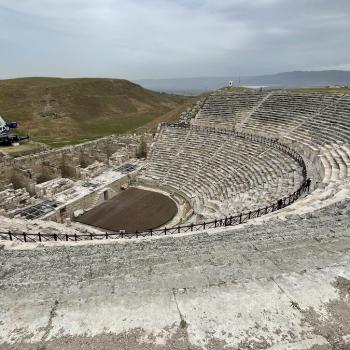
Justin Martyr’s testimony about coming to Christ must be one of my favorite stories of the second century. In his Dialogue with Trypho, Justin relates his encounter with a venerable elderly man walking by the sea coast of Ephesus. The year was about 130 AD when the young philosopher found himself contemplating his search for meaning in the ancient Greeks. Suddenly surprised by someone walking behind him, Justin turned to the Ephesian who asked, “Do you know me?” That simple question opened an exchange between the two that must have lasted hours.
No less than 25 questions later, the elderly Ephesian demonstrated a remarkable understanding of many subjects especially interesting to Justin. As the old man waited for his family, they discussed science, philosophy, and theology. Ultimately, the disciple of Christ challenged the disciple of Plato to consider those who more ancient than the philosophers. The Ephesian shared,
“And yet even on account of the miracles which they performed they were entitled to belief, for they both glorified the Maker of all things as God and Father, and proclaimed the Christ sent from Him, as His Son…”
Justin concluded sharing his testimony to Trypho and his friends:
“After saying this and many other things besides, which it is not now a fitting time to tell, he went away, bidding me follow his advice, and I saw him no more. But as for me, straightway a fire was kindled in my soul, and a passionate desire possessed me for the prophets, and for those great men who are the friends of Christ. And as I weighed his words within me I found that this alone was philosophy, and philosophy safe and serviceable.”
Faithful Lamp Stand
In my estimation, Justin became the greatest second century Christian philosopher. We only possess three of his written works but what I find most striking in his story is the faithful witness of the venerable Ephesian disciple. More than 70 years after the church of Ephesus began, its lamp stand still shined. The church took heed to the warning Jesus issued (Rev 2:9). The Christians in Ephesus continued the works of their first love.
The disciples in the Ephesian church offer a remarkable example of discipleship. Pure and simple, disciples talk about Jesus with others. Here’s the fifth characteristic in the study of disciples in Ephesus.
“Fifth, disciples are empowered by the Holy Spirit to be witnesses (Eph 5:18–19; 2 Tim 1:7). Jesus came to declare God’s glory. Paul, Timothy, John, and Peter modeled what that looks like in a movement. There is no wiggle room here. Disciples share the gospel in the power of the Holy Spirit with those they encounter no matter where they are. Yes, that includes the nations, but it also includes the home, office, grocery store, or any other place where people need the good news.” (Ephesiology, loc 3747)
Successful Witnessing
Years ago when I was on staff with Cru I learned that successful witnessing was taking the initiative to share the gospel in the power of the Holy Spirit and leaving the results to God. After all these years, I still agree with this definition—for the most part.
Like the elderly Ephesian disciple, however, taking initiative to share the gospel doesn’t mean street evangelism, knocking on doors house to house, or approaching people at the shopping mall. It might include these things at times. Yet, taking initiative looks different from place to place. More often than not, taking initiative happens when a salesman knocks on your door, or when someone turns to you and you ask, “Do you know me?”
Sharing the gospel doesn’t always include popular methods like 3 circles, 4 spiritual laws, or the Roman Road. Like Justin’s interlocutor, sharing the gospel takes knowing the right questions to ask, understanding the background of your audience, and connecting them with meaningful language explicitly about Christ.
And, just like the exchange in the story, leaving the results to God means just that. It isn’t always bringing a person to a prayer for salvation. Pointing them to proper sources and challenging them to explore for themselves truly allows God to work in their lives. After all, God’s desire for them to come to the knowledge of truth outweighs your desire.
Trypho and Friends
It cannot escape us that Justin winds up his dialogue with Trypho and his friends not in leading them in a sinner’s prayer. Rather, he urges them,
“…to enter on this greatest of all contests for your own salvation, and to endeavour to prefer to your own teachers the Christ of Almighty God.”
And finally he concludes,
“I can make no greater prayer for you, Gentlemen, than this, that having come to know that happiness is given to every man through this Way, you may do in all respects the same as we, acknowledging that the object of our worship is the Christ of God.”
Disciples witness on the seaside, in a dialogue with others, no matter where they find themselves.












